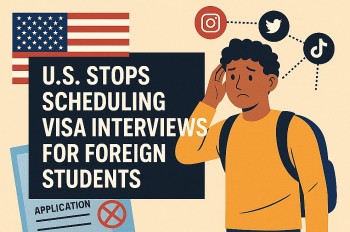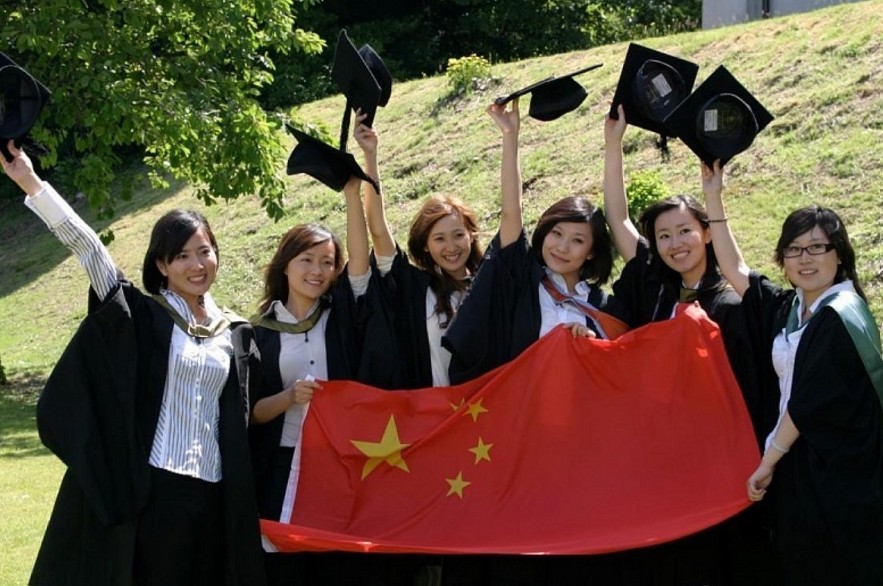How Many Chinese Students Are in the U.S.? Latest Numbers, Visa Crackdowns, and What’s Next
 Fact Check: New U.S. Policy on Terminating International Students’ Legal Status Fact Check: New U.S. Policy on Terminating International Students’ Legal Status |
 U.S. Halts Student Visa Interviews: What This Means and How to Prepare U.S. Halts Student Visa Interviews: What This Means and How to Prepare |
They fill STEM programs, power international tuition revenue, and build academic bridges between two global giants. But in 2025, U.S.–China educational dynamics are shifting rapidly. Visa revocations, rising geopolitical tensions, and stricter scrutiny are changing the landscape. This article dives deep into the current numbers, recent visa policy changes, and what the future may hold.
 |
| Chinese studied at American colleges |
1. How Many Chinese Students Are Currently in the U.S.?
As of the 2023–2024 academic year, 277,398 Chinese students are enrolled in U.S. institutions, according to Open Doors data published by the Institute of International Education (IIE). They make up 24.6% of the international student body and remain the largest single nationality group among foreign students.
This figure, however, marks a continued decline from the peak in 2019, when more than 370,000 Chinese students studied in the U.S. A mix of pandemic-era disruptions, tighter immigration policies, and worsening U.S.-China relations have contributed to this drop.
2. What Fields Are Chinese Students Studying?
The majority of Chinese students are concentrated in:
-
STEM fields (Science, Technology, Engineering, Math)
-
Business and Management
-
Social Sciences
STEM, in particular, accounts for nearly half of Chinese student enrollments. These students often pursue graduate degrees and are highly active in research.
This has drawn concern from U.S. lawmakers and security officials who fear potential knowledge transfer in sensitive technologies, especially in areas like artificial intelligence, semiconductors, and quantum computing.
3. What’s the Latest in the Visa Revocation Controversy?
In May 2025, U.S. Secretary of State Marco Rubio made headlines by announcing a crackdown on Chinese student visas. This includes plans to:
-
Aggressively revoke existing visas for students with links to Chinese military-affiliated institutions.
-
Increase scrutiny on applicants from China and Hong Kong, especially in “critical fields” such as cybersecurity, aerospace, and robotics.
-
Possibly expand visa denials to individuals believed to be tied to the Chinese Communist Party or state-sponsored talent programs.
This builds on earlier policies, such as the Proclamation 10043 issued under President Trump, which barred entry to Chinese graduate students with ties to China’s military-civil fusion strategy.
4. Who’s Affected?
The policy isn’t targeted at all Chinese students—but many feel the uncertainty. Those most at risk include:
-
Graduate students and researchers in STEM fields
-
Alumni of universities with military affiliations in China (e.g., Beihang University, Harbin Institute of Technology)
-
Individuals linked to Chinese government scholarship or talent recruitment programs
U.S. immigration and security officials are reportedly cross-referencing visa applications with databases of Chinese institutions and government affiliations.
5. Case Studies: Real Lives Disrupted
Chinese student advocacy groups have reported increasing numbers of students:
-
Being denied entry at U.S. airports after hours of interrogation
-
Having their F-1 or J-1 visas revoked suddenly
-
Facing delays or unexplained visa denials during consular processing
A notable 2024 case involved a PhD student in electrical engineering at Stanford who was denied re-entry despite holding a valid visa. The reason given: "security concerns." She had attended a university in China now flagged by U.S. authorities for military links.
6. Financial Implications for U.S. Universities
The potential expulsion or reduction of Chinese students could have massive financial consequences. Here's why:
-
Chinese students often pay full international tuition rates
-
They contributed over $10 billion annually to the U.S. economy at the peak
-
Universities with large Chinese populations—like UC Berkeley, NYU, and Purdue—rely on them for program funding and research grants
In some states, Chinese students account for one-third of all international tuition revenue.
7. What’s Driving the U.S. Government’s Actions?
The policy shift is grounded in national security concerns. U.S. officials cite:
-
Intellectual property theft
-
Espionage risks linked to research labs and tech startups
-
China's civil-military fusion doctrine, which integrates civilian academic research into military use
FBI Director Christopher Wray has stated that the bureau opens a new China-related counterintelligence case every 10 hours. Education and research are viewed as a frontline in that struggle.
8. China's Reaction
Beijing has condemned the visa revocations, calling them "politically motivated" and "discriminatory." The Chinese Ministry of Foreign Affairs has urged the U.S. to stop "weaponizing" academic exchanges and has threatened countermeasures.
In response, Chinese agencies have stepped up efforts to diversify student destinations, encouraging enrollment in Canada, the U.K., Australia, and countries involved in the Belt and Road Initiative.
9. Future Trends: What’s Next?
A. Slowing Chinese Enrollment
Analysts predict Chinese student numbers in the U.S. will continue to decline, both due to:
-
Visa uncertainty
-
Nationalistic sentiment rising in China
-
Growth of high-quality universities in China and Asia-Pacific
B. Rise of Other International Student Populations
India is rapidly catching up, and in some universities, Indian students now outnumber Chinese peers. Vietnam, Nigeria, and Brazil are also on the rise.
C. Tighter Screening, Not a Total Ban
The U.S. isn’t banning all Chinese students—but future admissions will be far more selective. Schools may be pressured to scrutinize partnerships with Chinese institutions or risk losing federal grants.
10. Policy Outlook and Recommendations
For policymakers:
-
There’s a delicate balance between national security and academic openness
-
Overreach could damage America’s reputation as the global leader in higher education
For universities:
-
Diversification of international student recruitment is key
-
More transparency in collaboration with foreign institutions is becoming a necessity
For students:
-
Stay informed
-
Avoid affiliations with controversial programs
-
Keep documentation clear and be prepared for extended processing times
FAQs
How many Chinese students are currently in the U.S.?
Approximately 277,398 Chinese students are enrolled in U.S. institutions for the 2023–2024 academic year.
What fields do Chinese students typically study?
Chinese students often pursue degrees in STEM fields, business, social sciences, and the arts.
What are the recent changes in U.S. visa policies for Chinese students?
The U.S. plans to revoke visas for Chinese students linked to the Chinese Communist Party or studying in sensitive fields, aiming to address national security concerns.
How might these policies affect U.S. universities?
Universities may face financial challenges due to the loss of tuition revenue and may experience decreased diversity and international collaboration.
What is China's stance on these U.S. policies?
China has criticized the policies as discriminatory and has urged the U.S. to safeguard the rights of international students.
Conclusion
The landscape for Chinese students in the U.S. is changing fast. While the U.S. remains a top destination, new policies are reshaping who gets in—and who doesn’t. As geopolitical rivalries intensify, universities, students, and policymakers will need to navigate a more complex and politically charged environment.
 UK Visa Fees to Rise from April 9, 2025: Full List of Changes and What They Mean UK Visa Fees to Rise from April 9, 2025: Full List of Changes and What They Mean From April 9, 2025, the United Kingdom will officially raise visa fees across a wide range of categories, including visitor, student, transit, work, and citizenship ... |
 What Is the F-1 Visa That the U.S. Has Revoked for International Students? What Is the F-1 Visa That the U.S. Has Revoked for International Students? The U.S. has revoked over 300 F-1 visas in a sweeping crackdown on international students over alleged activism and social media activity, raising alarm across ... |
 UK Launches £10 Travel Authorisation Fee for Visitors as ETA System Expands to Europe UK Launches £10 Travel Authorisation Fee for Visitors as ETA System Expands to Europe From this week, all visa-exempt visitors to the UK must apply for an Electronic Travel Authorisation (ETA) before travelling. |
 What Are the New U.S. Visa Interview Rules in 2025? Don’t Miss These Visa Changes What Are the New U.S. Visa Interview Rules in 2025? Don’t Miss These Visa Changes Planning a trip to the United States after April 2025? You’ll want to pay close attention. |























